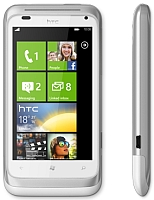
HTC Unveils 'Radar': The First Windows Phone 7.5 In India

 After unveiling a low-priced Android smartphone last month, HTC has added yet another mobile phone to its growing line of smart phones. Although this time around the company has ditched the Android operating system in favour of the latest version of Microsoft's Windows Phone 7.5 Mango. The new mobile phone code named 'HTC Radar' will be the first phone in India to run on the new mobile OS from Microsoft.
After unveiling a low-priced Android smartphone last month, HTC has added yet another mobile phone to its growing line of smart phones. Although this time around the company has ditched the Android operating system in favour of the latest version of Microsoft's Windows Phone 7.5 Mango. The new mobile phone code named 'HTC Radar' will be the first phone in India to run on the new mobile OS from Microsoft.
HTC Radar has a 3.8 inch S-LCD capacitive touch screen (480×800 pixel resolution) and it runs on the Windows Phone 7.5 Mango OS. The new operating system comes with a host of new features that we had written about earlier.
It is powered by a 1GHz Scorpion processor, Qualcomm MSM8255 Snapdragon chipset and has 512 MB of RAM. The internal storage in the device is 8GB out of which only 6.54GB is available to the user (although users can get 25 GB of additional Cloud based storage space with the Microsoft Sky Drive.).

The mobile phone has a 5 megapixel rear camera (with F2.2 lens) with LED flash and BSI sensor (for better low-light captures) that can record high definition videos at 720p. A front facing VGA camera has also been provided in the device.
The mobile phone is crafted from a single piece of metal and the dimensions of the device are 120.5mm x 61.5mm x 10.9mm and its weight is 137 grams. The device has a 1,520 mAh battery which according to the company will provide up to 10 hours of talk time and 480 hours of stand-by time. The device has an internal GPS antenna, HTC locations and Bing Maps
Additionally, the device comes with a microUSB port and has a stereo FM radio. For connectivity, the device has Bluetooth, Wi-Fi and 3G. The device should be priced somewhere around Rs 24,000 considering the specifications it is offering. Although since this is HTC's first mobile phone in India with Windows Phone 7.5 (Mango), they could have done a better job with the specifications.

HTC Radar's competitors in the Indian market will include Sony Ericsson's Xperia Arc, BlackBerry's Torch 9860 and Samsung's Galaxy R I9103.
